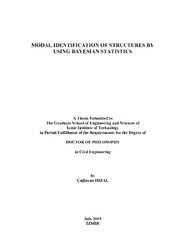Please use this identifier to cite or link to this item:
https://hdl.handle.net/11147/7440Full metadata record
| DC Field | Value | Language |
|---|---|---|
| dc.contributor.advisor | Turan, Gürsoy | - |
| dc.contributor.author | Hızal, Çağlayan | - |
| dc.date.accessioned | 2019-12-09T07:47:37Z | |
| dc.date.available | 2019-12-09T07:47:37Z | |
| dc.date.issued | 2019-07 | - |
| dc.identifier.citation | Hızal, Ç. (2019). Modal identification of structures by using Bayesian statistics. Unpublished doctoral dissertation, Izmir Institute of Technology, Izmir, Turkey | en_US |
| dc.identifier.uri | https://hdl.handle.net/11147/7440 | - |
| dc.description | Thesis (Doctoral)--Izmir Institute of Technology, Civil Engineering, Izmir, 2019 | en_US |
| dc.description | Includes bibliographical references (leaves: 155-160) | en_US |
| dc.description | Text in English; Abstract: Turkish and English | en_US |
| dc.description.abstract | Bayesian Probabilistic approaches in the health monitoring of civil engineering structures has gained remarkable interest during past decades. When compared to the available Operational Modal Analysis (OMA) methods, Bayesian Operational Modal Analysis (BAYOMA) determines a probabilistic range with a most probable value and uncertainty instead of a certain result. For this reason, the most important difference of BAYOMA lies in its capability of uncertainty quantification. Therefore, the modal parameters of a measured structure can be determined based on a probabilistic logic according to various cases (for example single measurement setup, well separated and/or closely spaced modes, multiple measurement setups). Further, the finite element model of the investigated structure can also be updated by a Bayesian approach incorporated with modal identification procedure. Some efficient BAYOMA methods such as Bayesian Spectral Density Approach (BSDA) and Bayesian Fast Fourier Transform Approach (BFFTA) have been presented by various researchers during the past two decades. Despite their efficient and fast solution procedure, the available methods have some critical issues that need to be solved. Most of these problems especially lie in the quantification of posterior uncertainties and some special cases arise in closely spaced modes and/or multiple setup measurement cases. In the literature, solutions for the aforementioned problems have been also presented by various researchers. In the light of the accumulated knowledge in the literature, this study presents a computational framework for BAYOMA and Bayesian Model Updating (BMU). In addition to some improvements to the available methods, new and alternative approaches are presented for BAYOMA and BMU. According to the results, it is seen that the quality of identified modal parameters and updated finite element models increases significantly by the proposed computational procedure. | en_US |
| dc.description.abstract | Bayezyan olsasılıksal yaklaşımları, inşaat mühendisliği yapılarının sağlığının izlemesinde, geçen on yıllar boyunca kayda değer bir ilgi kazanmıştır. Mevcut Operasyonel Modal Analiz (OMA) yöntemleriyle karşılaştırıldığında Bayezyan Operasyonel Modal Analiz (BAYOMA) yöntemleri, belirli bir sonuç yerine en olası değer ve bu değerin belirsizliğini içeren olasılıksal bir aralık belirler. Bu nedenle, BAYOMA'nın en önemli farkı belirsizlikleri tanımlama kabiliyetinde yatmaktadır. Böylece, ölçülen bir yapının modal parametreleri, çeşitli durumlara göre (örneğin tekil ölçüm grubu, iyi ayrılmış ve/veya çakışan modlar, çoklu ölçüm grupları gibi) bir olasılık temelinde belirlenebilir. Ayrıca, incelenen yapının sonlu eleman modeli, modal tanımlama prosedüründen elde edilen sonuçlar kullanılarak, bir Bayezyan yaklaşımıyla da güncellenebilir. Bayezyan Spektral Yoğunluk Yaklaşımı (BSDA) ve Bayezyan Hızlı Fourier Dönüşüm Yaklaşımı (BFFTA) gibi bazı etkili BAYOMA yöntemleri, son yirmi yıl boyunca çeşitli araştırmacılar tarafından sunulmuştur. Etkili ve hızlı çözüm prosedürlerine rağmen, mevcut yöntemlerde üstesinden gelinmesi gereken bazı kritik sorunlar da mevcuttur. Bu sorunların birçoğu, özellikle sonsal (posterior) belirsizliklerin belirlenmesinde yatmakta veya çakışan modlar ya da çoklu ölçüm grupları bulunması gibi bazı özel durumlarda ortaya çıkmaktadır. Literatürde, yukarıda belirtilen sorunlara yönelik çözümler çeşitli araştırmacılar tarafından sunulmuştur. Mevcut bilgiler ışığında, bu çalışma BAYOMA ve Bayezyan Model Güncelleme (BMU) için bir hesap çerçevesi sunmaktadır. Mevcut yöntemlerde bazı iyileştirmelere ek olarak, BAYOMA ve BMU için yeni ve alternatif yaklaşımlar sunulmaktadır. Elde edilen sonuçlara göre, tanılanan modal parametrelerin ve güncellenmiş sonlu eleman modellerinin kalitesinin, önerilen hesap prosedürü ile önemli ölçüde arttığı görülmektedir. | en_US |
| dc.format.extent | xv, 160 leaves | - |
| dc.language.iso | en | en_US |
| dc.publisher | Izmir Institute of Technology | en_US |
| dc.rights | info:eu-repo/semantics/openAccess | en_US |
| dc.subject | Modal analysis | en_US |
| dc.subject | Dynamic modelling | en_US |
| dc.subject | Optimization problem | en_US |
| dc.subject | Bayesian analysis | en_US |
| dc.subject | Damage detection | en_US |
| dc.title | Modal Identification of Structures by Using Bayesian Statistics | en_US |
| dc.title.alternative | Yapıların Bayezyan İstatistikleri ile Modal Tanılaması | en_US |
| dc.type | Doctoral Thesis | en_US |
| dc.institutionauthor | Hızal, Çağlayan | - |
| dc.department | Thesis (Doctoral)--İzmir Institute of Technology, Civil Engineering | en_US |
| dc.relation.publicationcategory | Tez | en_US |
| dc.identifier.wosquality | N/A | - |
| dc.identifier.scopusquality | N/A | - |
| item.openairecristype | http://purl.org/coar/resource_type/c_18cf | - |
| item.cerifentitytype | Publications | - |
| item.languageiso639-1 | en | - |
| item.grantfulltext | open | - |
| item.fulltext | With Fulltext | - |
| item.openairetype | Doctoral Thesis | - |
| crisitem.author.dept | 03.03. Department of Civil Engineering | - |
| Appears in Collections: | Phd Degree / Doktora | |
Files in This Item:
| File | Description | Size | Format | |
|---|---|---|---|---|
| T001925.pdf | DoctoralThesis | 5.58 MB | Adobe PDF |  View/Open |
CORE Recommender
Page view(s)
420
checked on Apr 14, 2025
Download(s)
1,166
checked on Apr 14, 2025
Google ScholarTM
Check
Items in GCRIS Repository are protected by copyright, with all rights reserved, unless otherwise indicated.